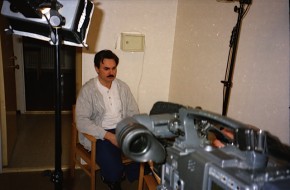The Laserman – the documentary

Photo: Gellert Tamas
“What made The Laserman – the documentary great were the private films, among other things showing a young man, not yet renamed Ausonius, travelling around Europe together with two of his buddies.”
Markus Wilhelmsson, Expressen
On the 12th of June 1992, after the largest police operation in Swedish history since the murder of Olof Palme, John Ausonius was arrested in the middle of a bank robbery in central Stockholm. That also marked the end of the hunt for the mysterious Laserman, who had shot and tried to kill 11 Swedes, all with a foreign background
In the documentary Gellert Tamas and Malcolm Dixelius paint a psychological portrait of the racist serial killer Ausonius,a murderer who was later praised both by the Norwegian mass murderer Anders Behring Breivik and the serial killer of Malmö, Peter Mangs, as a forerunner in the militant struggle against “immigrants”.
Through unique material, such as super 8 films and interviews with childhood friends, we get to follow Ausonius from his childhood in the Stockholm suburb of Vällingby, where he was bullied for his black hair, to the end of the 1980’s when he became a successful yuppie. In a way similar to Tamas’ bestselling documentary novel the person Ausonius, as well as his actions, are put into a larger societal context.
“One of the most interesting things about this documentary are the interviews with Ausonius himself. They didn’t give any explanations to his actions. Nor did they offer any possibility to understand his own view of the matter, for that he remained to cold and observing. But exactly there lay some sort of insight; there is no explanation or possibility of understanding.”
Astrid Söderbergh Widding, Svenska Dagbladet
“A well made and powerful documentary visualizing the person behind the “monster”. Instead of simplifying the producers construct a complex picture depicting how a once bullied boy came to shake the very foundations of Swedish society during a politically dark period of time in our history. The documentary reminds us that values like democracy and tolerance can be utmost fragile.”
Kristallen 2005, årets bästa dokumentär

